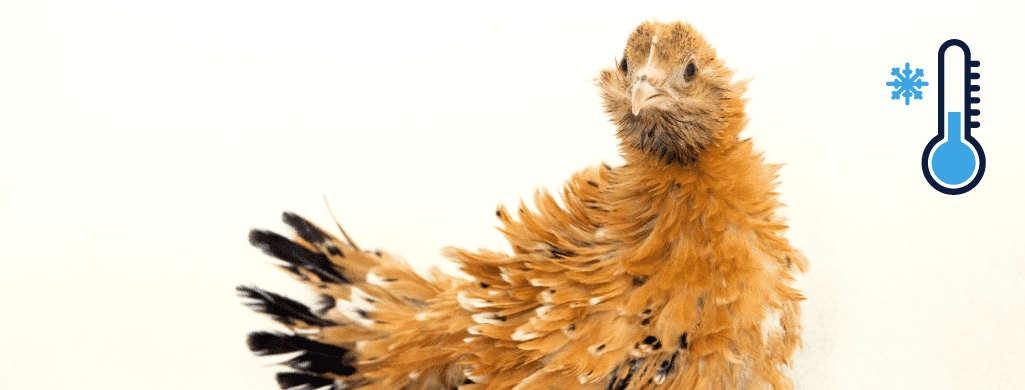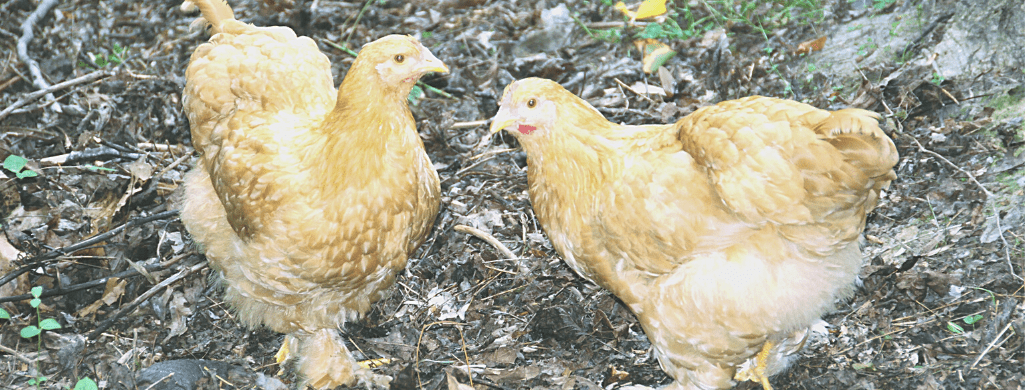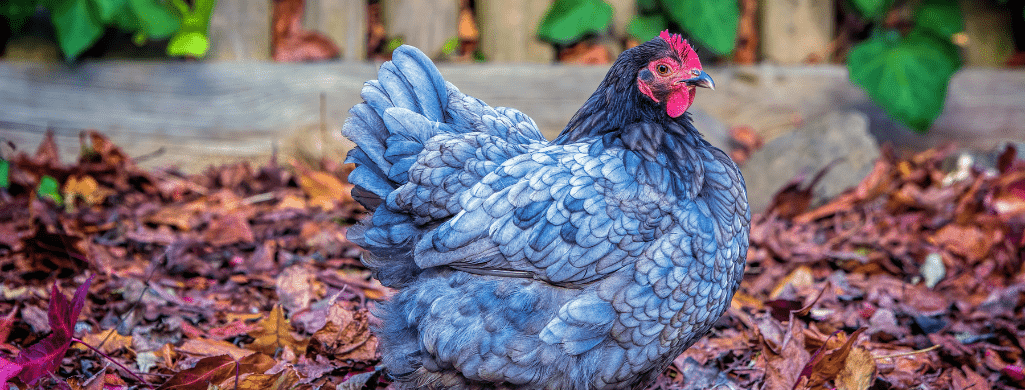Cochin chickens (formerly known as Cochin-China and Shanghai Birds) are known for their large size, fluffy feathers, friendly disposition, and feather-covered feet.
Indeed, they’re a fun breed with good-tasting eggs, but are they cold-hardy chickens?
Cochin chickens are excellent winter breeds due to their stout bodies, smaller combs (in hens), and thick and heavy feathering. These feather-footed birds may get water, snow, ice, or moisture trapped on their feet and heavy feathers, which can cause them to be more susceptible to frostbite during cold winters.
Some Cochins also exhibit frizziness, which causes the feathers to curl outwards instead of laying flat against the body.
These Frizzle Cochin breeds are more vulnerable to the cold, as the curled feathers are not very waterproof.
Although they are cold hardy, Cochin chickens (especially the frizzled kind) need to be kept warm through the harsh winters.

Table of Contents
ToggleWhy Cochins Do Well In Colder Climates
Cochin Chickens are large birds, similar in size and stoutness to the Brahma Chicken. Their weights can go up to 11 pounds in roosters and up to 8.5 pounds in hens.
They are known for their good personalities and relative inactivity (other than foraging), which causes obesity in some Cochin flocks.
However, this extra weight helps them retain body heat and high body temperatures during the cold months.
Their dense feathering is also very full, soft, and fluffy. They tend to have looser feathering, unlike other tight-feather breeds like Rhode Island Red.
Related Reading: Pros and Cons of Cochin Chickens
Although Cochins feather slower, their feathers cover their entire legs, feet, and toes, with only two partially exposed toes.
These extra fluffy warm feathers help Cochins retain heat in the winter, but the feathers may also cause overheating in the summer.
Cochin chicken hens have very small rounded single combs close to their heads and small wattles. This makes them less prone to frostbite than feather breeds with larger combs.
Male Roosters have medium-sized combs and longer wattles, requiring additional protection from icy winds.
Their larger size is a big help, and it also makes them great meat birds.
Further Reading: Eating Cochin Chickens: Is IT OK?

Frizzled Cochins Struggle in Colder Climates
Cochin chickens, especially Bantam Cochins, occasionally exhibit frizziness due to an incomplete dominant gene.
This causes the frizzled feather shafts to twist and curl, which gives Frizzle Cochins their unique curled-out plumage.
While this makes them incredibly cute, it also makes Frizzy Cochins more susceptible to the cold, as the frizziness causes their feathers to lose their waterproofness.
The curled-out feathers also do not retain heat very well and are prone to damage in icy winds.
Note: Frizziness is technically not a breed but a genetic mutation occurring in several varieties such as the Polish, Plymouth Rock, Japanese bantam, and of course, the Cochin chicken.
However, Frizzle chickens are recognized as distinct breeds by breeders in countries such as England, Australia, France, Germany, Italy, Ireland, etc.
Protecting Your Cochins In Winter
Protect your regular and frizzled Cochins from the cold by adding a few extra winterizing features to their coop.
Keep a thermostat in the coop to monitor temperatures for freezing conditions.
Some chicken owners will also heat their coop with heat lamps or outdoor heaters designed for barns and chicken coops like these on Amazon.
Close coop windows closed at night, but keep just a crack open for ventilation.
Seal up cracks in their coop to avoid drafts and wet conditions. Keep some vents open for ventilation, though.
For larger coops, keep bales of hay or pine shavings under the roost or along the outer walls.
Further Reading: Cochin chicken roosting guide
Lower the ceilings or create temporary walls to keep the coop space smaller, which should help keep things warm up faster.
Cover smaller coops with blankets or a tarp during extra-cold temperatures to help your Cochins retain heat.

Other Winter Caring Tips for Cochin Chickens
Frostbitten Legs
All the extra feathers on Cochin chickens help to keep their upper bodies warm, but the extra feathers on their feet make them more vulnerable to getting ice, moisture, and snow trapped in their feet feathers.
Keep their coop warm with a heat lamp in winter and cover their run with some hay bedding, corn cob bedding, or pine shavings as extra layers for insulation.
This will help keep them warm and prevent moisture from gathering on their leg feathers.
Keep them active with things to pick on, such as cabbage, if cooping them in.
A perch also helps to keep them warm and dry. Heat also rises, so this should provide some extra warmth.
The warmth from nearby perched chickens makes a difference too.
Since Cochin chickens do not fly, don’t keep the perch too high.
Winter Sickness
Cochin breeds are hardy and healthy birds, but like other chickens, they may fall victim to sickness during the colder months.
A great way to check up on them is to listen for gurgling or sneezing noises outside their coop in the evenings, just after dark. These noises indicate sick chickens.
Typically, these sick noises are undetectable in the daytime due to regular crowing.
If your pet chicken is sick, give them a little medicated water and provide them with plenty of heat in winter.
Mites in Winter
In the warmer months, Cochins like to forage and roam. During winter, the Cochin breed’s tendency toward brooding and laziness emerges.
In a cooped-up environment, all the extra warm feathers and broodiness make Cochin chickens excellent mothers, but they also make them magnets for mites.
Examine them carefully every once in a while along the vent and behind the combs and base of their necks.
Developing Cochin birds will also be more prone to mites as they may still have blood.
If mites are found, apply some over-the-counter parasitic remedies such as food-grade diatomaceous earth powder.
Some crushed-up garlic in their drinking water also helps repel mites.
Treat one infected bird as though all are infected if they live in the same coop.
Keep Pens Clean in Winter
All the extra heat, moisture, and tight quarters in cold climates also mean your chickens will be a little dirtier and damper.
Cochin chickens aren’t too active foragers, so wet manure tends to gather in the center of the cages.
This is an invitation for fungus, mice, and mites to gather.
Use moisture-wicking bedding such as corn cob bedding or hay whenever possible.
Clean pens more frequently during the winter to keep these lovely birds happy.
Frozen Drinking Cups
If temperatures dip below freezing, drinking cups may also freeze over.
A good way to deal with this is to fill the cups only halfway with water in the evenings.
If they freeze over during the night, add water on top of the ice in the daytime.
Warmer temperatures will melt the previously frozen ice, giving your chickens a refreshing treat.
How useful was this post?
Click on a star to rate it!
We are sorry that this post was not useful for you!
Let us improve this post!
Tell us how we can improve this post?
